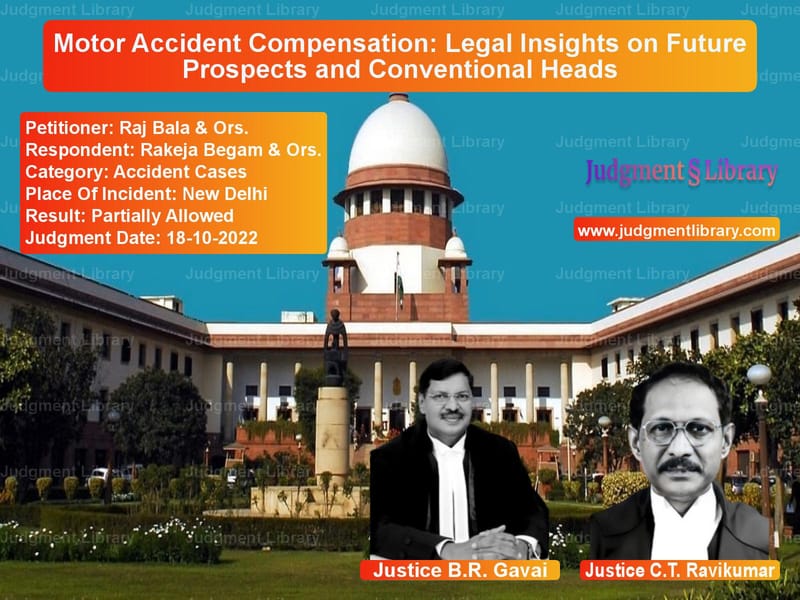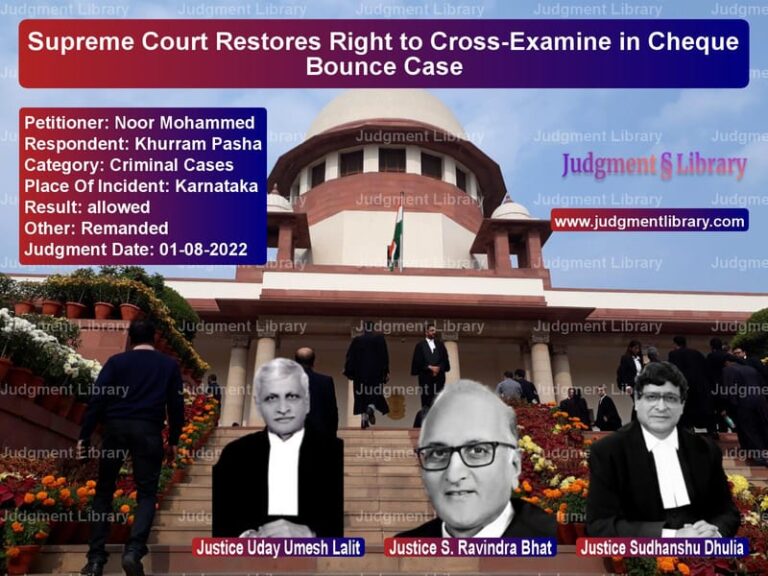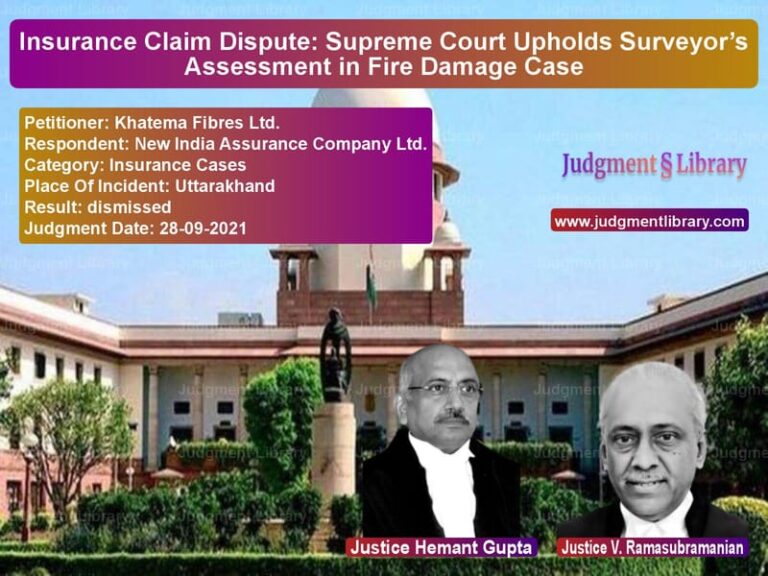Motor Accident Compensation: Legal Insights on Future Prospects and Conventional Heads
This case arises from a motor vehicle accident that led to the unfortunate death of Shri Sudesh Kumar, a Head Constable in the Railway Protection Force (RPF). The appellants, the wife and children of the deceased, sought enhanced compensation for the loss caused by the accident. The petitioners challenged the compensation awarded by the Motor Accidents Claims Tribunal (Tribunal) and the re-assessed amount granted by the High Court, arguing that certain key factors, including future prospects and compensation for loss of consortium, were inadequately considered. The Supreme Court’s judgment addresses these concerns and re-evaluates the compensation amount in accordance with established principles from prior rulings.
Background:
The deceased, Sudesh Kumar, was a 32-year-old Head Constable in the Railway Protection Force. He tragically died on 11th August 2009 when the bus he was traveling in fell into the river Chenab. The accident was caused by rash and negligent driving by the bus driver, who was the deceased’s husband. The appellants, who were the legal heirs of Sudesh Kumar, filed a petition seeking compensation under Section 166 of the Motor Vehicles Act, 1988, claiming a total of Rs. 50 lakhs for the loss of the deceased’s life. The Motor Accidents Claims Tribunal awarded compensation of Rs. 17,73,704, which included various heads of compensation, and the High Court later enhanced this amount by Rs. 2,95,000. However, the appellants felt that the compensation did not adequately reflect the loss sustained, particularly in terms of future prospects, funeral expenses, and loss of consortium.
Appellant’s Arguments:
The appellants contended that the High Court had erred by not considering the deceased’s future prospects while calculating the compensation under the ‘loss of dependency’ head. They cited the landmark judgment in National Insurance Co. Ltd. v. Pranay Sethi, where the Court held that an addition of 50% of the actual salary of the deceased should be made towards future prospects if the deceased had a permanent job and was below 40 years of age. Since the deceased was a permanent government employee, the appellants argued that the principle in Pranay Sethi’s case should have been applied to increase the compensation for loss of dependency. They also pointed out that no amount was granted under the heads ‘loss of estate’ and ‘funeral expenses,’ which should have been awarded under conventional heads according to the Pranay Sethi decision.
The appellants further challenged the compensation awarded under the head ‘loss of consortium.’ They argued that the High Court had incorrectly applied the compensation rate of Rs. 1 lakh for loss of consortium, which was excessive and should be revised in line with the principles set out in Pranay Sethi’s case. Additionally, the appellants sought more compensation for the loss of love and affection, especially for the minor children of the deceased, who were left without parental support.
Respondent’s Arguments:
The respondents, including the Jammu and Kashmir State Road Transport Corporation (4th Respondent), defended the compensation awarded by the High Court, arguing that the amount granted was just and reasonable. The respondents contended that the Tribunal had correctly applied the principles set out in previous judgments while determining the compensation. They emphasized that compensation for loss of dependency was based on the actual income of the deceased, which had been appropriately calculated by the Tribunal, and the appellants were not entitled to any further enhancement.
The respondents also pointed out that the compensation for loss of consortium was adequately addressed by the High Court, and that the appellants were not entitled to additional amounts for loss of love and affection, as this head of compensation was not recognized by law. They further argued that the High Court had already awarded a reasonable amount under the heads of funeral expenses and loss of estate, in line with established judicial precedents.
Court’s Analysis:
The Supreme Court reviewed the compensation awarded by both the Tribunal and the High Court, paying particular attention to the arguments regarding future prospects, the conventional heads of compensation, and the adequacy of the compensation for loss of consortium and love and affection. The Court acknowledged the importance of the Pranay Sethi judgment, which provided clear guidelines for determining compensation for loss of dependency, particularly in terms of adding 50% to the actual salary for future prospects when the deceased had a permanent job and was below 40 years of age.
The Court found that the deceased, being a permanent employee of the Railway Protection Force, fell within the criteria set out in Pranay Sethi’s case. Therefore, the Court held that 50% of the actual salary should have been added to the compensation for loss of dependency, resulting in an enhancement of the amount awarded by the High Court. The Court calculated the revised amount for loss of dependency as Rs. 26,52,960, compared to the Rs. 17,68,704 awarded earlier.
On the issue of conventional heads of compensation, the Court found that the appellants were entitled to compensation for loss of estate and funeral expenses, as stipulated in the Pranay Sethi decision. The Court awarded Rs. 15,000 for each of these heads, which was consistent with previous judgments. The Court also found that the High Court’s award for loss of consortium was excessive, and adjusted it to Rs. 35,000, in line with the principles laid down in Pranay Sethi. The Court also ruled that the compensation for loss of love and affection was not legally justified and, therefore, was not to be awarded.
Judgment:
The Supreme Court allowed the appeal in part, enhancing the compensation amount as follows:
- Enhanced compensation for loss of dependency: Rs. 26,52,960
- Compensation for loss of estate: Rs. 15,000
- Compensation for funeral expenses: Rs. 15,000
- Compensation for loss of consortium: Rs. 35,000
- Compensation for loss of love and affection: Nil
The total compensation was calculated as Rs. 10,29,260, after deducting excess amounts granted by the High Court and adjusting the figures for loss of consortium and love and affection. The Court directed that the enhanced compensation be paid by the 4th Respondent within eight weeks, with interest at 6% per annum from the date of the appeal until realization.
Conclusion:
This case highlights the importance of fair compensation in motor vehicle accident cases, particularly when determining the amount for loss of dependency and the conventional heads of compensation. The Supreme Court’s decision reinforces the application of the principles set out in Pranay Sethi’s case and ensures that the family members of the deceased receive just compensation, taking into account the future prospects of the deceased and the losses suffered by the family. The judgment also clarifies the legal position regarding compensation for loss of consortium and love and affection, providing a clear framework for future claims in similar cases.
Petitioner Name: Raj Bala & Ors..Respondent Name: Rakeja Begam & Ors..Judgment By: Justice B.R. Gavai, Justice C.T. Ravikumar.Place Of Incident: New Delhi.Judgment Date: 18-10-2022.
Don’t miss out on the full details! Download the complete judgment in PDF format below and gain valuable insights instantly!
Download Judgment: raj-bala-&-ors.-vs-rakeja-begam-&-ors.-supreme-court-of-india-judgment-dated-18-10-2022.pdf
Directly Download Judgment: Directly download this Judgment
See all petitions in Road Accident Cases
See all petitions in Compensation Disputes
See all petitions in Motor Vehicle Act
See all petitions in Judgment by B R Gavai
See all petitions in Judgment by C.T. Ravikumar
See all petitions in partially allowed
See all petitions in supreme court of India judgments October 2022
See all petitions in 2022 judgments
See all posts in Accident Cases Category
See all allowed petitions in Accident Cases Category
See all Dismissed petitions in Accident Cases Category
See all partially allowed petitions in Accident Cases Category







